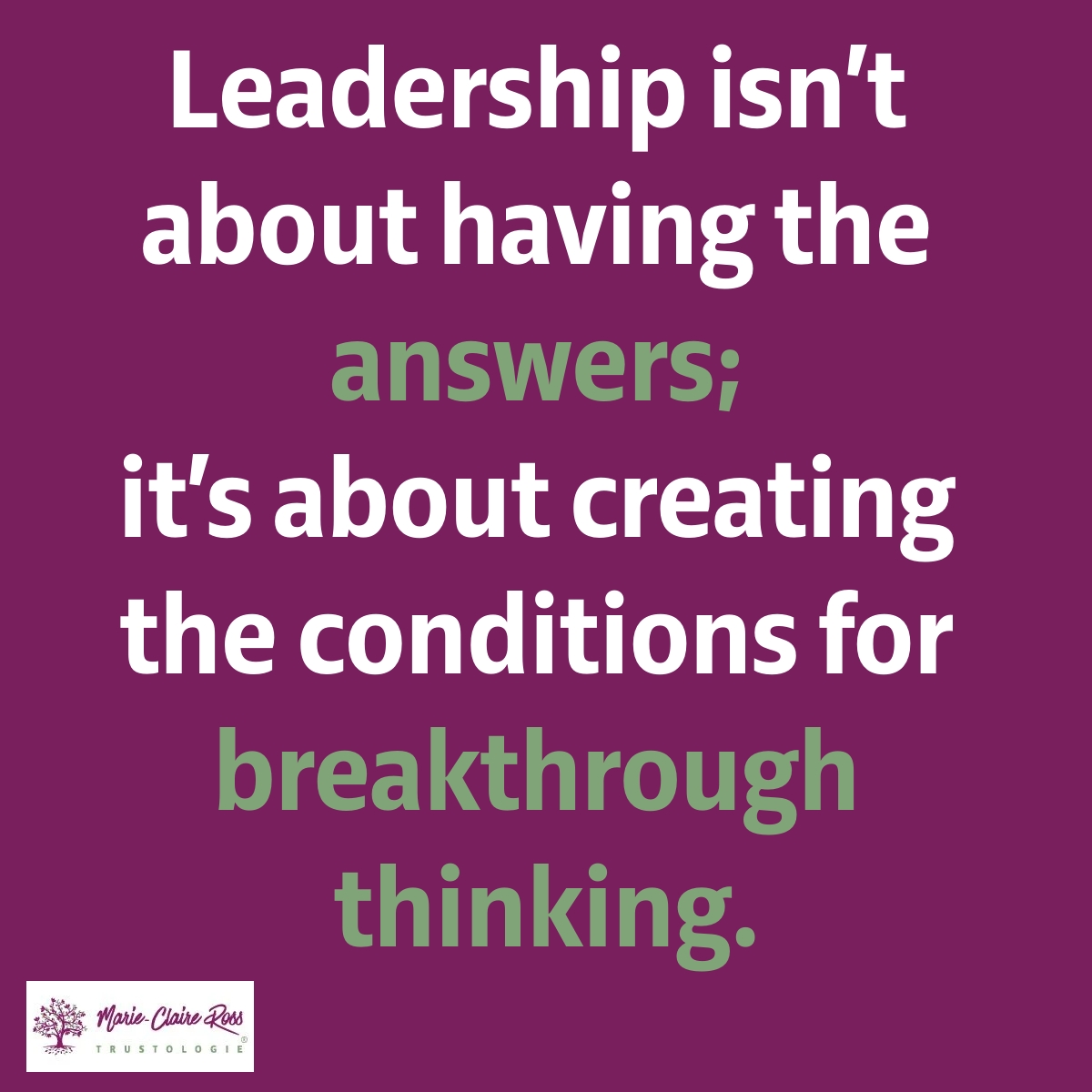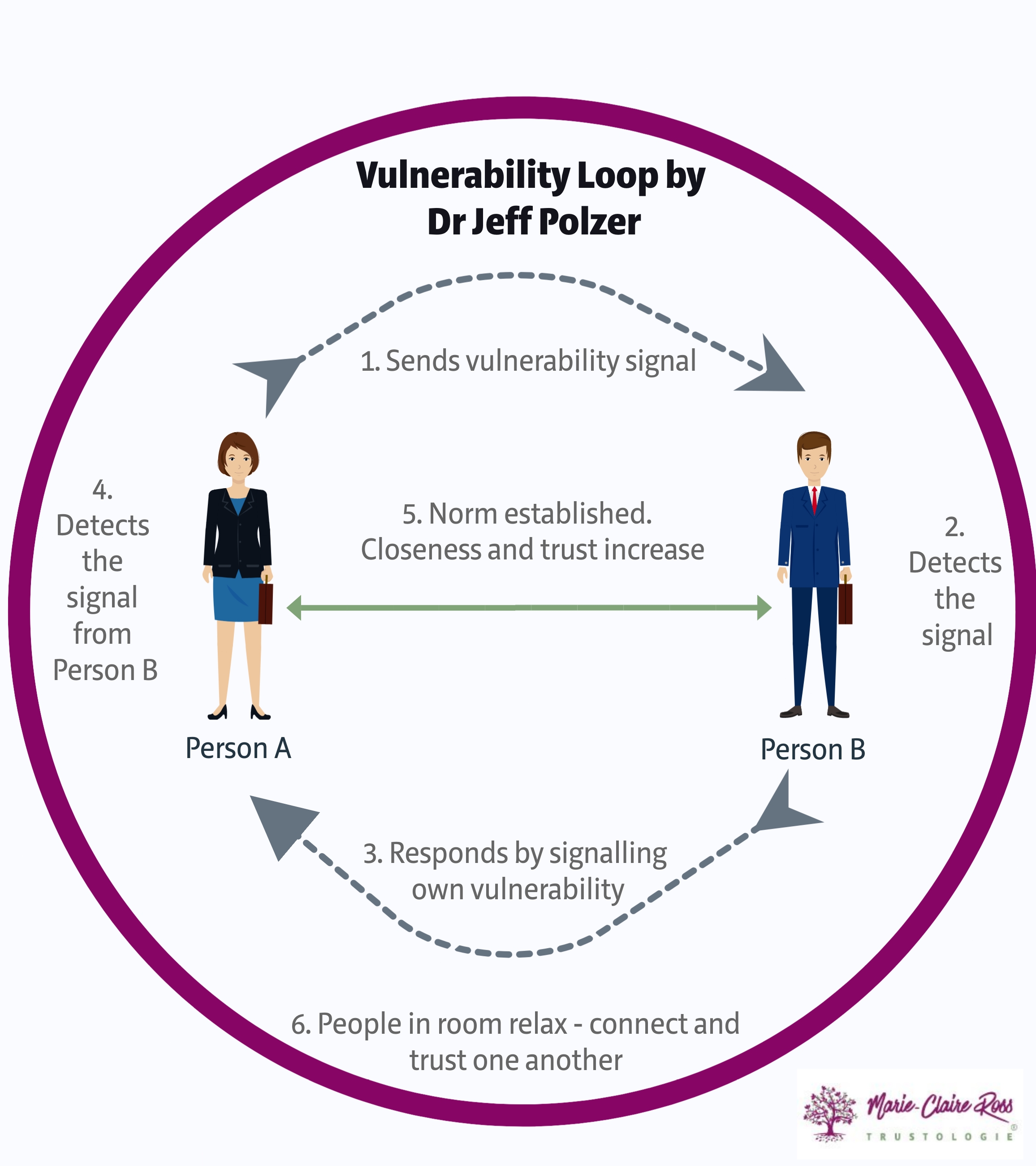8 min read
Beyond the "Why": 5 Coaching Secrets to Unlock Curiosity in Leadership
When my daughter was 17 months old, she discovered a superpower: the word “Why?”For the next two years, it was her response to almost everything.
Develop leaders, strengthen executive teams and gain deep insights with assessments designed to accelerate trust and performance.

Transform how your leaders think and perform with keynotes that spark connection, trust and high-performance cultures.

Explore practical tools, thought-leadership and resources to help you build trusted, high-performing teams.

Trustologie® is a leadership development consultancy founded by Marie-Claire Ross, specialising in helping executives and managers build high-trust, high-performing teams.

5 min read
Marie-Claire Ross : Updated on May 8, 2024

I have a confession to make.
When it comes to hosting a dinner party, I'm like an old-school 70s suburban housewife. I cook up everything myself from starter to dessert. I spend hours in the kitchen and start cooking the night before the big event.
I love planning the food. I love searching for the right recipes. I detest processed food. And I love making new things in the kitchen and sharing the love with my guests.
But I'll be honest, it's never been appreciated by my friends (only my family). I'm not sure if it's because I'm a really bad cook and no-one is comfortable telling me. Or I have friends with really poor social skills or an intense aversion to my healthier style of cooking (most likely).
What has always been interesting for me are the type of compliments I get from guests (if you can call them that).
For my last dinner party (five years ago), I spent quite a bit of time lovingly making some cauliflower buffalo bites as an appetiser. They had been rolled in a tangy marinade, dipped into some cornstarch and seasoning. Then, baked until they were golden brown and crunchy. They were served with a buffalo sauce I had made from scratch. Honestly, they were perfection.
My friend, Jen, took a bite. Then another one, while we were deep in conversation. In between bites, she stopped talking (rare) and said "These are so moreish. Is this cauliflower?"
Me: (excitedly) "Yes!"
Jen: "I never knew cauliflower could taste this amazing."
Me: (feeling proud and wanting to share the recipe) "They have been dipped in a marinade, then rolled in a seasoning and then baked. It's a bit of a long pro-" She cut me off.
Jen: "Where did you buy the cauliflower from?"
Me: (feeling the oh-so-familiar hurtful pangs of under-appreciation) "Um, Footscray Market."
Jen: "Wow. They must sell really good cauliflowers. I'll have to try that market. Hey, Andrew (partner's name), try this cauliflower. It's from Footscray Market. We have to shop there."
She might have well of asked me what brand oven I had used. :(
Recognising people for their hard work is key to engagement and building trust. After all, we all want to be seen, heard and valued.
Many of us know the benefits of acknowledging our employees for their good work. Yet, just like my friend Jen, a lot of leaders do appreciation in a wonky kind of way that sabotages their results.
Here are some of the steps that trips up our efforts:
1. Avoid the tendency for non-specific praise. If you are a positive person, you might automatically jump to "Good job!" or "Well done!" While that might make you feel good, and your direct report for a little bit, it's actually pretty ineffective and can work against you.
A lot of employees complain to me about leaders who regularly use broad praise. The reason? It shows you're not paying attention to what they are really doing.
Take one teacher who told me she distrusted the previous school vice principal who would say to her "You're a great teacher!" In her head, she would question the praise by asking: "How would you know? You've never even watched me in the classroom."
Using superlative-laced praise is lazy. Not only does it make people distrust you, but it's also more likely to create entitled employees.
2. Praise what's under people's control or effort - When we give recognition, we need to be specific about what the person did well. This means knowing the difference between what's under their control. These are qualities like the effort they put in, the decisions they made, their patience in trialing things out, fixing up an issue or their willingness to work well with others.
While things out of their control include luck, good looks or natural capabilities. You can also extend this out to the computer they used, the machine or the vehicle.
As Whitney Johnson says in the book, "Build an A Team", a smart manager encourages without entitling people. This means "Be stingier with extolling the attributes that are not under a person's control: native talents appearance and good fortune. These are the things that often lead to an outsized since of privilege."
Through the research of Carol Dweck on growth mindset versus fixed mindset, educators have come to understand that praising children for being inherently smart implies that intelligence is a fixed trait that is either present or absent. This can lead to a sense of helplessness as individuals may feel judged based on an unchangeable attribute.
Of course, focusing what's under people's control is also respectful. When you compliment the oven or the cauliflower, you are completely ignoring the work they put in. Your compliment becomes back-handed.
3. Be specific about the outcome achieved - Letting people know exactly what they did well and how it helped others is crucial. Not only does it reinforce what behaviours you want to see (so people will repeat them), but it lets people know what's important for you.
It's about mentioning the tangible actions they took and the result it achieved.
For example, "Thanks Lauren for completing those tax forms on time. I love how you stepped in at the last moment and got them done so meticulously. It took a big load off my shoulders and I could finish the board report."
Another example is "Marie-Claire, this cauliflower tastes amazing. You have magically transformed a vegetable into something that I normally find bland into something incredibly delicious." (Now, that gives me a lovely endorphin boost. I can even feel the oxytocin flowing through my veins, so that I feel like my friend is someone I can trust.)
4. Be generous - Leaders always tell me that they regularly recognise their staff, but when I ask their reports I get a lot of surprised looks.
As individuals gain more confidence and skills, managers often hesitate to offer praise. However, they should amplify their recognition efforts, as indicated by a study conducted by Zenger and Folkman, which revealed that the most effective managers provide a balance of both praise and constructive criticism. Most managers who think they are great, give more criticism than praise.
Not only that, a lot of people are inconsistent in their approach as to who gets the praise.
My friend Jen is always filled with praiseworthy stories whenever I see her. She compliments her team, her partner and her friends. But when she is in the company of her children, 90% of the time nearly all of her praise is related to her children. Even at parties at her house, her daughter will walk past, and she will interrupt the conversation to tell her daughter her hair looks beautiful.
And I get it, children are amazing and parents need to praise generously (and granted her kids seem to have hit the jackpot with good looks and high IQs, which makes them ideal candidates for receiving praise for just being, not doing).
Of course, in a workplace you can't be seen to be playing favourites. Make sure you regularly praise each and every team member at least once a week.
5. Check your biases - I have noticed that my female friends don't praise my cooking. But their partners? Much more likely.
Now, I don't know if it's because of some sort of secret competition that women play with each other that I'm not aware of or whether I have friends that are extremely proud of their cooking prowess (or lack of it).
All I know is that when someone doesn't give praise (when complimenting is a pretty normal prosocial thing to do) then something is up. It smacks of jealousy, pettiness, rudeness or just plain ignorance.
In a workplace, when we don't praise our reports, we need to check in truthfully with ourselves as to why we are not comfortable with appreciation. Sometimes it can be as simple as we don't want to acknowledge someone who is doing a better job than us, at a task we value. Other times, we don't want people to feel good about themselves because we don't feel good. Or we don't really like someone and don't want them to get big-headed.
It doesn't matter what the reason is, what matters is that we do the work to clear that up. After all, the benefits of giving regular specific praise far outweigh the negatives.
And as for my friend Jen, paradoxically, she was one of the first friends I ever had that lavished heaps of praise on me. Her ability to recognise within me what others didn't (but I so wished they did), floored me. So while she is weirdly contradictory in the area of recognising my culinary skills, she praises me for things that are much, much more important to me. And in the end, for me her friendship is worth its weight in gold.

8 min read
When my daughter was 17 months old, she discovered a superpower: the word “Why?”For the next two years, it was her response to almost everything.

11 min read
I have a friend who often finds herself at the mercy of her emotions. Recently, she called me to rehash a confrontation she’d had with a group of...

9 min read
True leadership presence isn’t a performance or a set of charisma hacks; it is the felt experience of who you are being in the room. By cultivating...

A common statement made about trust is that you need vulnerability. Building trust requires team members to be vulnerable with one another. That...

One of the interesting things I find when it comes to safety is that some safety professionals (some, not all) like to play bad cop when it comes to...

Why is that successful and well-managed companies struggle with change and disruptive innovation? Too often, what got companies to where they are...